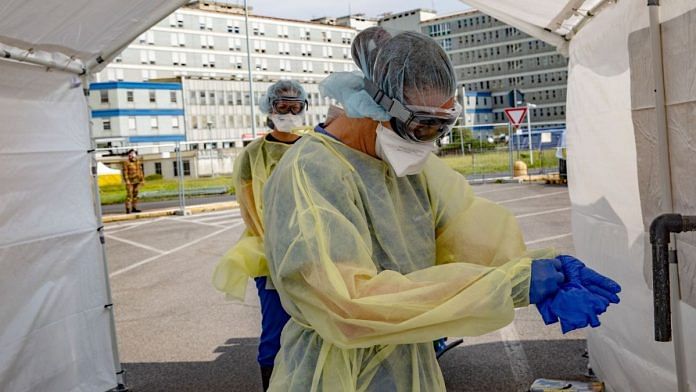 Virus in a globalised India
Virus in a globalised India
Sanjaya Baru | Policy analyst and former media advisor to prime minister of India
The Indian Express
Baru comments on the coronavirus pandemic and the travel restrictions due to it. He notes that since countries are looking inwards during this moment of crisis, many believe that it will mark a turning point in globalisation. However, Baru argues, “To imagine that the current episode marks a turning point for the globalisation of people and economies is not just a historically ill-informed view but also a self-defeating one”. He writes, “Mankind has faced many such challenges posed by nature and other species but has continued to move, cohabit and populate around the world,” and will continue to do so once the crisis ends.
 Remaking the future
Remaking the future
Sujan R. Chinoy | Former ambassador and currently the director-general of the Manohar Parrikar Institute for Defence Studies and Analyses
The Indian Express
Chinoy comments on the coronavirus pandemic and says that “COVID-19 is creating inflection points for the global economy, [and] will bring changes that will be lasting in healthcare, security, governance.” He argues that “nations will have to rethink possible future scenarios and create numerically adequate forces of well-equipped pandemic experts, doctors and healthcare workers, to be the new foot soldiers in this battle.”
 The race to find a cure for COVID-19
The race to find a cure for COVID-19
Virander Chauhan | Former Chairman of UGC and former Director of the International Centre for Genetic Engineering and Biotechnology where he currently holds the Arturo Falaschi Chair
The Hindu
Chauhan comments on the vaccine development for coronavirus and argues “reasonable scientific rationale and the information needed for vaccine development are available to all stakeholders in academia and industry”. He notes that given the urgency of the situation, it is essential to find out what works well and what doesn’t and thus, controlled randomised trials is the “only way to go” to arrive at a possible cure efficiently.
 The crumbling of India’s economy
The crumbling of India’s economy
Maitreesh Ghatak | Professor of Economics at the London School of Economics and director, Development Economics Programme, STICERD
Hindustan Times
Ghatak comments on the economic impact of the coronavirus pandemic. “Economic activity is all about interaction among people. Trade and commerce thrive on these webs of interactions, which is why cities are more prosperous than villages” explains Ghatak. He argues that “higher the population density, and the wider the exposure to the outside world, the greater the risk of contagion” and that’s why the virus has hit trade and commerce so much.
 To mitigate the crisis, rethink role of regulators
To mitigate the crisis, rethink role of regulators
Vivan Sharan | Partner at Koan Advisory Group, New Delhi
Hindustan Times
Sharan comments on the regulatory action required to deal with the coronavirus. He says conventional wisdom tells us that bold steps are required but these measures may not entirely be suitable for India’s economy. He recommends “an alternative path to building economic resilience — by repurposing its regulators to be more market-friendly”. Sharan argues that “regulated markets will remain stressed in the medium-term” and the “message for regulators is loud and clear — they must put the economic dimension of public interest at a much higher pedestal than they do, during this period.”
 E-commercial gains to be made
E-commercial gains to be made
Hitesh D. Gajarla | Partner, KPMG India
The Economic Times
Gajarla discusses the amended Finance Bill and observes that the government has taken measures to “enhance tax collections immediately…on account of the Covid-19 crisis”. He discusses the expansion of the scope of the equalisation levy from ‘e-commerce supply or services’ to ‘e-commerce operators’ starting 1 April. With “tax revenues likely to plummet across the world, the pressure on governments to implement unilateral measures will only grow”, he concludes.
 A bright spot in the Corona crisis
A bright spot in the Corona crisis
Jamal Mecklai | CEO, Mecklai Financial
Financial Express
With everyone helping and learning from each other amidst the COVID-19 outbreak, Mecklai predicts this “new humanity” will override “the divisive politics that the globe has been suffering over the past decade or so”. The shift is already being seen across countries, in their approach to government spending by providing a direct “line of support” to the poor, he explains.
 Reflections on the pandemic
Reflections on the pandemic
Deepak Lal | Economist
Business Standard
Lal argues that there is disagreement among epidemiologists on whether there is enough “evidence on which to base draconian policies like lockdowns” in view of the coronavirus pandemic. WHO’s “top emergency expert” Mike Ryan said lockdowns can’t defeat the virus “which will resurface when the lockdowns end”, he mentions. Hong Kong, Singapore, Taiwan and South Korea have shown that quick and easy testing can control the spread of the virus “without the need for socially and economically disruptive lockdowns”, he adds.
 The Covid-19 crisis could bring the country up to digital speed
The Covid-19 crisis could bring the country up to digital speed
R. Jagannathan | Editorial director, ‘Swarajya’ magazine
Mint
Jagannathan says Covid-19 is a chance for us to form “an agenda that brings us up to technological speed in various spheres of human activity”. He says the outbreak can let us re-evaluate major initiatives of the Modi government — demonetisation and digitisation. He observes that the first was an obvious “economic failure” but the second is imperative during this pandemic be it in the form of work from home, online payments or video-conferencing in the Indian judicial system.
 An income support plan for the poor to tide over testing times
An income support plan for the poor to tide over testing times
Niranjan Rajadhyakshya | Member of the academic board, Meghnad Desai Academy of Economics
Prakhar Misra | Senior associate, IDFC
Mint
The authors point out that the lockdown in India to contain Covid-19 will economically devastate 303 million informal sector workers. An “unconditional cash transfer of ₹10,000 to each informal sector worker” should “provide an initial buffer to see them through two or three months at a very basic standard of living”, they suggest. However, states can’t do this on their own, especially since some of the poorest states have the highest proportion of informal workers, they add.
 Transition to ‘work from home’ may pay off
Transition to ‘work from home’ may pay off
Narindar Pani | Professor, School of Social Science, National Institute of Advanced Studies, Bengaluru
Hindu Business Line
Pani discusses whether companies will shift to a work-from-home policy post pandemic. He notes that there won’t be a complete “migration to the new rules” but perhaps organisations will consider working from home for part of a few days in a week. This will change work culture, remove unduly focus on the “hours” spent in office along with effective monitoring strategies to ensure there is no “fall in accountability”, he explains.
Today’s Editorials
Hindustan Times: The moment of national honour Sunday, 22 March for those risking their lives to keep things going during coronavirus, doesn’t appear to have translated into meaningful action, writes HT. The boycott of Air India employees and doctors by some of the resident welfare associations behaving like authoritarian republics, is entirely unacceptable, it writes.
Times of India: The government must use the 21-day lockdown window to ramp up healthcare facilities, writes TOI. The need for personal protective equipment (PPE), masks, ventilators have already been highlighted by the doctors. It notes that the clock is ticking fast for both the lockdown and capacity building activities, it says.
With inputs from Unnati Sharma





There is only that way to stop spreading covid-19 to stay at home only,Government and companies are always wants good health of the employee/Nagrik. So we should be follow on same way only . Companies are providing work from home option just bcs of employees health is first priority. Once we all come up from that major situation. So we will start altogether our work from office only.
Let come together againt COVID-19. Defintly we will get our success. “Burai ki jeet Kabhi Nahi Hoti achai ki jeet Hoti hai”.